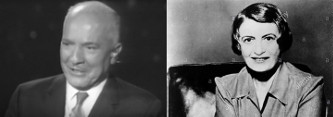Here’s Shikha Dalmia with an opinion to offend both left and right equally:
Donald Trump and Al Gore would no doubt cringe at the thought that politically speaking, they are brothers from different mothers. After all, what do the Republican president and the Democratic presidential wannabe have in common besides the fact that they are both old, white, pompous dudes who live in mansions and hate Hillary Clinton?
Whether they realize it or not, they both believe in the precautionary principle — the notion that even a small chance of a catastrophic event requires sweeping measures to avert it. Nor do they care about the costs of these “sweeping measures” — both in terms of money and individual liberty.
Their only disagreement is about the events in question: Trump invokes this principle in his crusade against Islamist terrorism — and Gore and his fellow global warming warriors against climate change.
Dick Cheney famously declared that if there was even a “1 percent chance” of another 9/11-style attack by al Qaeda, “we have to treat it as a certainty in our response.” For all of Trump’s criticisms of the Iraq War, he has a natural instinct for this kind of excess. No sooner did the dastardly Manchester attack occur than Trump reiterated, as he had in his inaugural address, that this “wicked ideology must be obliterated.”
[…]
Given that the odds that Americans will perish in any terrorist attack — not just those involving Islamists — on U.S. soil is 1 in 3.6 million per year — if the trends of the last four decades are any indication, such draconian steps to avert another 9/11-style event won’t make Americans substantially safer. But they will make them substantially less free.
Liberals understand this when it comes to dealing with global terrorism. Al Gore himself gave a great speech in 2006 lamenting all the constitutional protections that the war on terrorism was claiming and expressed alarm that the executive branch had been conducing warrantless surveillance of telephone calls, emails and other internet communication inside America.
But when it comes to global warming, Gore’s ideological blind spots are more dazzling than the sun. He condemned Trump’s pullout from the Paris agreement as “indefensible” and “reckless.” Likewise, the ACLU, which has been heroically fighting Trump’s travel ban and other constitution-busting moves, bizarrely tweeted that the withdrawal would be a “massive step back for racial justice.”
But the fact of the matter is that a pre-emptive strike against climate change will be no less damaging for justice, racial or otherwise.




